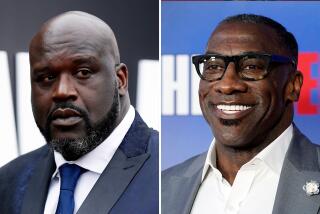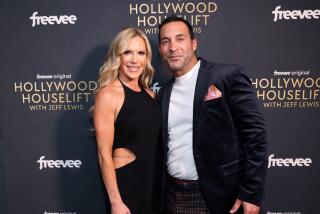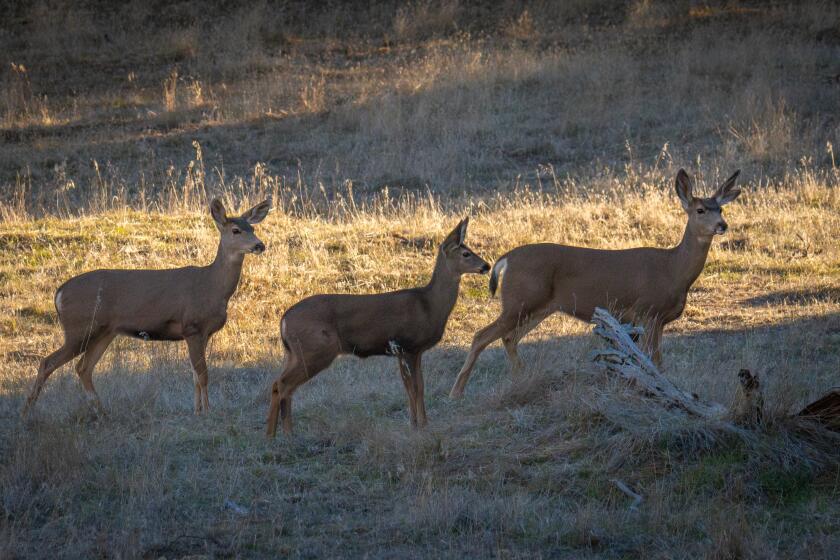Horse Trainer, 77, Intends to Stay on Track
One of the surest bets at Hollywood Park this season is that Noble Threewitt will be there. The 77-year-old Threewitt has been a horse trainer longer than the race track has been taking bets.
Threewitt has trained horses for races at Hollywood Park in Inglewood since the track opened 50 years ago. And on opening day Wednesday, he had a horse running in the first race, Calgary Court.
And like a lot of the bettors who ended up with worthless slips of paper, his horse wasn’t in the money.
Outstanding Record
But Threewitt is used to losing, and winning. When the Santa Anita thoroughbred season ended recently, he finished with what’s considered an outstanding record--his horses won 10 of the 30 races they entered. (According to a track brochure, the winningest trainer during Hollywood Park’s 1987 fall season won 30% of his races. The other trainers won between 14% and 24%.)
Threewitt’s horses have run at all the Southern California tracks and at major tracks around the country.
“One of the big things about racing is that you meet some wonderful people, people from all walks of life,” he said. He has trained horses for Burt Bacharach and Fred Astaire. The best horse he has trained, Correlation, who won the Florida Derby and the Wood Memorial, was the runner-up in the Preakness Stakes and placed fifth in the Kentucky Derby--although he was the favorite--all in 1954.
He doesn’t see such potential in any of the 16 horses he is training now.
At one point in his career, Noble Threewitt--he laughed when told that his name sounds like a race horse’s--trained 50 horses at a time. Until recent years, he had about 30 under his care. In 1956, horses he trained won nine consecutive races at the former Tanforan race track near San Francisco, which is still a record as far as he knows.
“Now a lot of people think I’m too old to train horses. I don’t get the offers I used to,” he said. “I don’t think that’s true.”
He recalled a former New York trainer who worked with winning horses until he was 90.
Threewitt, president of the California Horsemen’s Benevolent and Protective Assn., has no plans of slowing down. “It keeps you young; you’re too busy to get old,” he said.
He and his staff of 11 grooms, exercisers and assistants begin their 4 1/2-hour workout with the horses at 5:30 each morning. Threewitt decides the training and racing schedules of the horses and makes sure they are prepared for their races.
He thinks of himself as a coach, he said. “Horses have peculiarities just like human beings, and you have to figure out how to get the most out of them.”
Threewitt, who lives with his wife, Beryl, in San Gabriel, said his affection for horses stems from his youth in Illinois, when he observed his grandfather, “a country veterinarian.” Threewitt started riding horses in fairs and later became a jockey. By the age of 20, Threewitt was too heavy to be a jockey--he was 118 pounds “with dieting”--so he became a trainer. Threewitt is 5-foot-9, weighs 155 pounds and looks much younger than his 77 years.
He began his career as a trainer in 1931 in Caliente, Mexico, and moved to Southern California in 1934--a year after pari-mutuel wagering was legalized in the state.
During the last 50 years, the purses have gotten bigger, and, he said, “that’s what makes racing--bigger purses.” The trainer and the jockey each get 10% of the purse.
The problem with being a trainer, Threewitt says, is that acquaintances often ask him for tips.
“I usually say: ‘I think he’s got a chance,’ if I can get by with it. But some people want you to tell them who the horse can beat and all that--that bothers me.”
He said he feels bad if he says a horse will run well and it doesn’t.
“I hate to see people lose their money.” And, he added, trainers are not always the most objective observers. Like parents who think their child is the best and the brightest, trainers tend to think their horse is a winner.
He quoted a former horse owner as saying: “You can talk about a man’s wife, but don’t talk about his horse.”
Threewitt doesn’t bet on the horses himself. “I’m one of the few trainers that don’t,” he said, adding that he bet occasionally many years ago. “I was never a big bettor. I’m a bad loser, so I quit,” he said.
Trainers who bet on a horse they have worked with can be disappointed twice, he said. “You’re disappointed that you lost your money and you’re disappointed that your horse lost.”
More to Read
Get our high school sports newsletter
Prep Rally is devoted to the SoCal high school sports experience, bringing you scores, stories and a behind-the-scenes look at what makes prep sports so popular.
You may occasionally receive promotional content from the Los Angeles Times.






